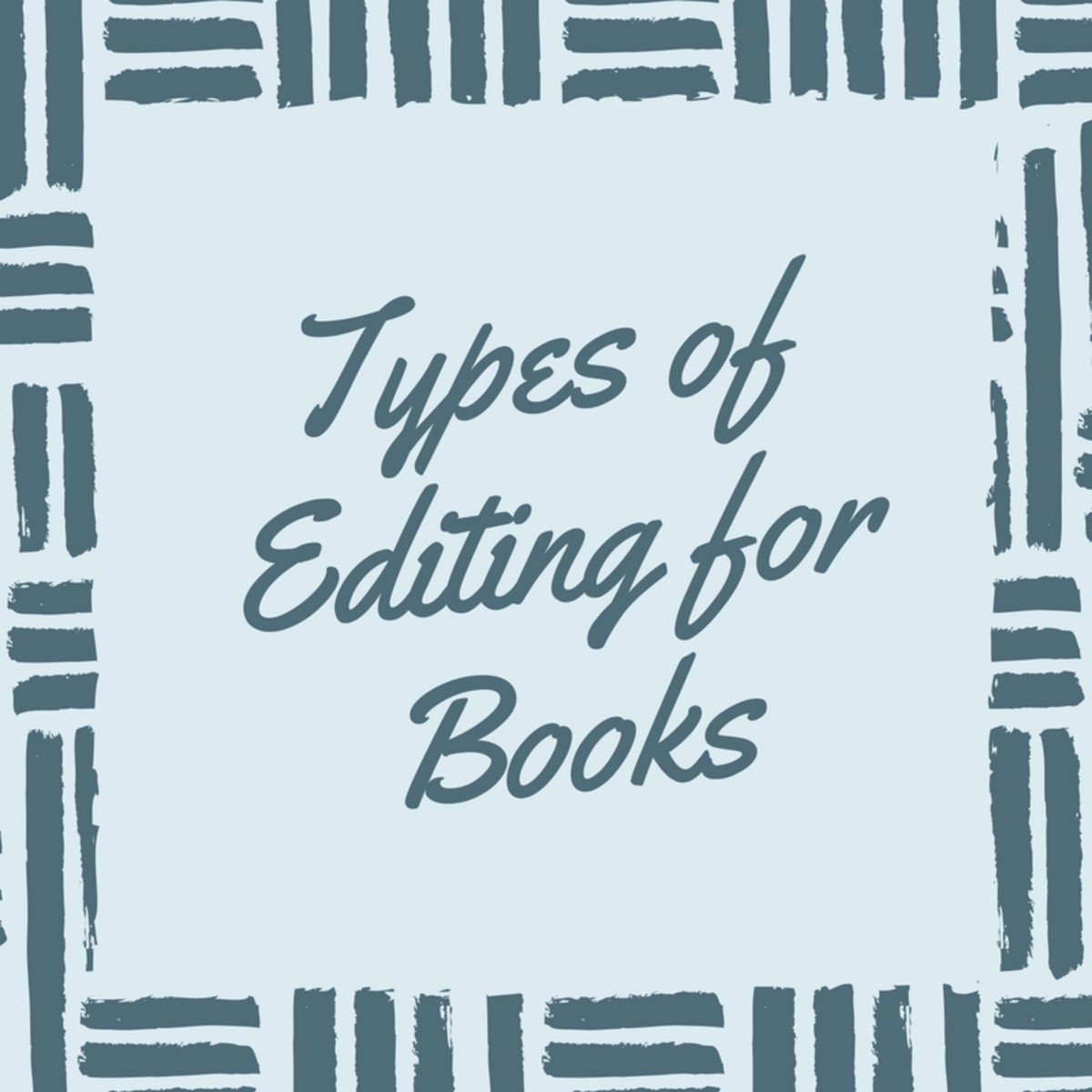How to Grade and Improve Your Own Writing Skills
Elements of Good Writing
Developing our writing skills is important in grade school, of course, and throughout our schooling. As we become adults, it takes on an added importance as we enter the business world, as all occupations involve communicating effectively with others. We also need it for our financial and other transactions in our personal lives. Communicating with our friends, families, business acquaintances, and everyone else becomes even more important. When we write letters to our friends, the editor, our politicians, businesses, we need to make sure they understand what we are saying, and are motivated to take the actions we desire.
Since writing is such an important part of our lives, it is beneficial for us to assess our writing own skills, with the focus on improving them. Our teachers are not there to do that for us, and it is better for us to do it for ourselves than to struggle in getting our point across to others.

Grading Our Own Writing
When we assign a grade in our writing, we can quantity our current standing, and compare our skills over time. There are many factors in grading a writing sample, and they all work together to determine how well written an article or piece of writing is. You may want to grade each factor individually, and assign an overall grade as well.
It is important to keep all of these factors in mind, and use them to grade the quality of our writing. In this way, we can work on our strengths to fortify them. We can also identify our weaknesses, and work to improve them.
The following is a list of elements to determine the quality of writing, and to help find areas of improvement when editing a piece of work. All of these elements are related to each other. An issue with one element is likely to impact the other elements as well.
Some of these factors are used by many standardized tests, including the National Assessment of Educational Progress, and Ohio Achievement Assessment.
Purpose
Imagine that someone is paying you two cents for your thoughts about a subject. If your writing does not contain what the reader is expecting, he will go away very angry or disappointed. Reading the directions on a school assignment or the task for a test is an important part of writing well. For an online writer, the purpose is listed in the title. Be sure that your writing accurately reflects what the reader is expecting.
If you are writing about how to tie shoelaces, for example, the reader should have a general grasp, if not a full understanding of, how to tie shoelaces when he are finished. If your writing recommends that he buy shoes without shoelaces instead, he will go away dissatisfied, or demand a refund. If the reader wanted to know about alternatives to shoelaces, he would have chosen a different article to read.
The standardized tests assess three types of purposes:
- to persuade, to change the reader's point of view or affect the reader's action
- to explain, to expand the reader's understanding
- to convey experience, either real or imagined
The type of writing must fit the purpose for which it is intended. If you are trying to persuade, you must choose a side, and discuss your reasoning with evidence. If you are trying to explain, the reader must be thoroughly informed through description, explanation and analysis. If you are writing a story, it must have setting, characters and a plot.

Organization
A well written article or essay is properly organized. It has a beginning, middle, and end. The reader is able to follow your thoughts from beginning to end without getting confused. Related ideas are grouped together in a coherent fashion.
Separating different ideas by use of paragraphs helps the reader understand the writing. In hubs and articles, the use of subheadings, white space, divider bars, and other layout choices also help in the organization.
Development
A well developed story or piece of writing helps the reader put themselves in your shoes. She can see what you see, and understand how and why you feel the way you do. She is satisfied with the experience.
In grading development, think about the decisions you made when writing your work. Did you choose examples that properly supported your argument? Your support should be relevant and convincing. Are the different points presented in the proper order? Did you build the proper momentum? How was the pace of your writing? Was the writing quality consistent throughout the work?
Focus
The focus of the work must stay on the purpose at hand. Whether it is a big picture overview, or a very detailed explanation, it must stay on task. All of the information presented must relate to the task, without veering off on tangents or providing irrelevant information.
Let Amazon Help You with Your Writing Skills
Word Choice
Using a variety of words is helpful to avoid repetition and boredom. Specific and descriptive words are preferred to general and generic words. Take the following example: "She went to the store." Using more specific words, such as rushed, raced, walked, jogged, stumbled, or sauntered will give the reader a clearer picture of what happened and get a feel for her personality.
The vocabulary is specifically chosen to drive forward the purpose of the writing.
Details
The reader must receive enough details to be able to see the world through your eyes. Details help her get a clear picture of what happened, and help her distinguish the story of your wedding from all the other weddings she has attended.

Progression
Written work with good progression flows smoothly from start to finish. The reader does not stumble as she tries to comprehend what is being conveyed.
Some of good progression has to do with the development, but there are other techniques that also provide a smooth flow. Sentence construction also helps with the progression.
Transitions help guide the reader from one idea to the next. They help you take the readers by the hand and lead them through your work.
Audience Awareness
A writer must keep the audience in mind at all times. If you are writing to the President, your writing will be more formal than if you are writing a letter to your mother.
If you are writing to a person who has never met you, you will have to take the time to give her some background information before launching into your topic.
An awareness of the audience means you will try to keep your writing interesting to keep them engaged, and include all the relevant details that help the readers understand what you are trying to tell them. A well written article does not leave the reader guessing about what a particular term means, or lost and confused because you assumed that they knew your schedule.
Since each article and book stands alone, it should clearly state your opinion and intention. If you are writing a political opinion, the reader should be able to understand your standing without having to read all of your other books and writings to understand your intention.

Tone and Voice
Voice and tone are important elements in writing. You want to present yourself as knowledgeable on the topic without being condescending. You want to inject your personality in your writing to maintain the reader's interest. An article without voice can be dull and boring. These elements must fit with the purpose of the writing and the intended audience.
Sentence Structure
The construction of the sentences also helps with the progression. Compare these two sentences:
"The boy has blonde hair. He is going to school. He has a blue book bag. He got on the bus." and
"The blond-haired boy put the blue book bag over his shoulder as he climbed on the school bus."
They both convey the same information, but the first one uses simple sentences and feels choppy. It seems to be a list of facts. The second one progresses smoothly from one idea to the next. The details are used to build the progression of the story instead of sitting alone.
Spelling, Punctuation and Grammar
Unfortunately, spelling, punctuation and grammar are the only things that some people consider when they are judging or editing their work. An adult is expected to use words that are spelled properly, using proper punctuation and correct grammar. Works without these types of errors do not get additional credit, although work with these types of errors would get lower scores.
Be sure to ask someone else to check your writing, or use a grammar checker. Do not skip over errors that a grammar checker finds. You shouldn't automatically change something just because someone or a computer program tells you to. Be sure to do the research to make sure that you are correct on your facts. Especially if you have been making the same error repeatedly over time, it is easy to assume that your spelling is correct, even if it isn't. This research will help you try to avoid making similar errors in the future.
Editing and Improving Your Work
Whether you are attempting to improve a particular piece of work, or to improve your writing overall, it is useful to use these elements to evaluate the quality. By breaking down the work into these elements, you will be able to identify the strengths and weaknesses, and work to build on them. Sometimes, simply being aware of the issue will help you direct your focus on improving it on your own. Other times, you may need to read books, ask some experts, do some research, or take classes to get the improvement you need.
Communication is such an important part of life, for adults as well as for children, that it behooves us to continuously work on improving our writing skills throughout our lives.









